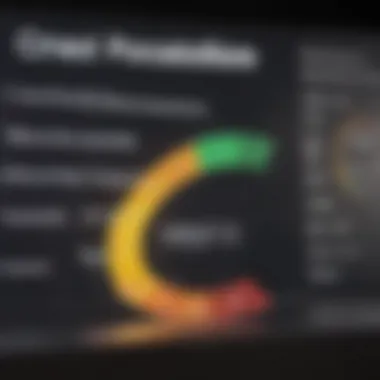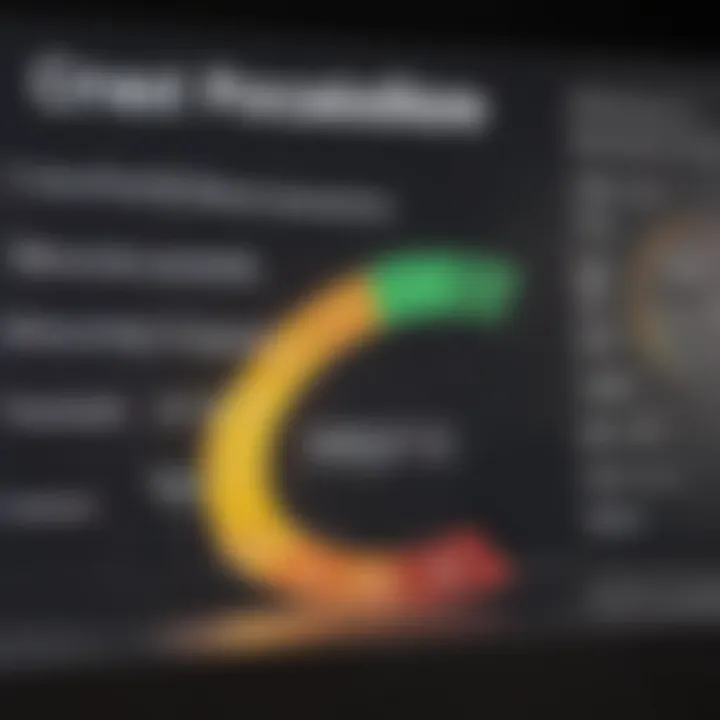The Role of Credit Cards in Car Leasing Decisions


Intro
When considering car leasing, many potential lessees overlook the role credit cards play in the leasing process. Understanding this relationship is crucial. While some may think of credit cards solely as tools for everyday purchases, their impact on car leasing cannot be underestimated. This article presents a detailed overview of the necessity of having a credit card during car leasing, linked directly to credit scores and alternative financing options.
Understanding Credit Scores
Importance of Credit Scores
Credit scores are more than just numbers; they represent an individual's creditworthiness. When leasing a car, lenders often use these scores to assess risk. A higher score could result in better leasing terms, including lower interest rates. For many, secure financing hinges on a favorable credit score. Without it, potential lessees might face higher payments or be denied leasing options entirely.
Factors Affecting Credit Scores
Several factors contribute to the determination of a credit score:
- Payment history: Consistent payment in full and on time positively influences the score.
- Credit utilization: The ratio of credit used to total credit available should ideally be low.
- Length of credit history: A longer, positive history helps bolster the score.
These elements are interrelated, and managing them well can lead to significant improvements in credit ratings.
Tips to Improve Credit Scores
Improving a credit score is not an overnight process, but practical steps include:
- Regularly check credit reports for errors and dispute any inaccuracies.
- Pay bills on time and reduce outstanding debts.
- Utilize credit responsibly, ensuring to keep credit utilization below 30%.
By consciously working on these factors, individuals can elevate their credit scores, making leasing more accessible and affordable.
Exploring Financial Options
Types of Credit Products Available
While credit cards are essential, various credit products can be explored. These may include personal loans, auto loans, and secured credit cards. Each works differently, but all can influence one’s credit and purchasing power.
Comparison of Credit Monitoring Services
Monitoring services actively track credit scores and provide alerts for significant changes. Popular services include:
- Credit Karma: Free and user-friendly.
- Experian: Offers in-depth analysis and identity protection features.
- Equifax: Provides regular updates and advice on improving scores.
Using these tools helps individuals stay informed and proactive about their financial health.
Steps to Protect Against Identity Theft
Identity theft can severely impact credit scores. To mitigate risks, one should:
- Use strong, unique passwords for financial accounts.
- Monitor bank and credit card statements for unusual activity.
- Consider credit freeze options to restrict new credit inquiries.
By taking these steps, individuals better protect themselves from financial risks.
Debt Management Strategies
Different Ways to Consolidate Debt
For individuals with existing debt, consolidation can simplify payments and potentially lower interest rates. Options include:
- Balance transfer credit cards. They often come with introductory 0% APR periods.
- Personal loans specifically for debt consolidation.
Creating a Personalized Debt Repayment Plan
A well-structured debt repayment plan requires:
- Identifying total debt amount and interest rates.
- Prioritizing repayments by focusing on high-interest accounts first.
This approach not only aids in settling debts efficiently but also improves credit scores over time.


Negotiating with Creditors for Better Terms
Open communication with creditors can lead to concessions, such as lower interest rates or extended payment terms. It is important to be clear and honest during negotiations, presenting a case for why adjustments may be beneficial.
Savings Advice for Financial Well-Being
Importance of Building an Emergency Fund
An emergency fund provides peace of mind and financial security. It should ideally cover three to six months' worth of living expenses. This fund can prevent unexpected costs from derailing leasing plans.
Automated Savings Techniques
Setting up automated transfers from checking to savings accounts is an effective strategy. This method allows for consistent savings growth without requiring constant oversight.
Investing Tips for Long-Term Financial Goals
For long-term financial health, consider:
- Starting with low-cost index funds or ETFs.
- Regularly contributing to retirement accounts.
These strategies can build wealth over time and complement smart credit use when leasing a vehicle.
Prolusion to Car Leasing
Leasing a car can be a strategic option for those who value flexibility and convenience. It offers a way to drive a vehicle without the full financial commitment that comes with purchasing outright. Understanding how leasing works is essential, especially in relation to the financial tools needed to navigate the process effectively. The inclusion of a credit card in car leasing can play a significant role in securing a favorable lease agreement and facilitating transactions.
Definition of Car Leasing
Car leasing is essentially a long-term rental agreement that allows an individual to use a vehicle for a specified period, typically ranging from two to four years. Rather than buying the vehicle, the lessee pays a monthly fee to the leasing company for access to the car. At the end of the lease term, the individual returns the car, usually in good condition, and may have the option to purchase it or lease another vehicle. This arrangement often appeals to those who prefer to drive newer models without the upfront costs of ownership.
How Car Leasing Works
The mechanics of leasing involve several steps. Initially, a potential lessee selects a vehicle and approaches a dealership that offers leasing options. The dealership will present different terms based on the car’s expected depreciation, which is a significant factor in determining monthly payments.
A down payment may be required, although many leases offer low or no upfront costs. Monthly payments are calculated based on the vehicle’s price, estimated compounded interest, and the residual value at the lease's end. The lease is finalized by signing a contract, which includes stipulations on mileage limits and maintenance responsibilities.
Benefits of Leasing a Car
Leasing offers several distinct advantages:
- Lower monthly payments compared to financing a purchase, allowing you to drive a more expensive model.
- Access to the latest technology and safety features, as you can frequently upgrade to newer models.
- Maintenance coverage, as many leases come with warranty protection covering repairs and routine maintenance.
- No trade-in hassle, since returning the car at lease end removes the complexities of selling or trading in a vehicle.
The Role of Credit Cards in Financial Transactions
In the context of leasing a car, understanding the role of credit cards is crucial. Credit cards serve as a utility that enhances a consumer's buying power and offers various protections during financial transactions. This is especially relevant in the auto leasing arena, where significant expenses are involved. Having a credit card can not only simplify the financial process but also provide access to additional benefits that might be critical when leasing a vehicle.
Credit cards can be viewed as a safety net that allows car lessees to manage their financial responsibilities more effectively. With the potential for unforeseen expenses—such as maintenance or insurance payments—credit cards afford the consumer flexibility. They ensure that the lessee will not be caught in a bind when unexpected costs arise.
Understanding Credit Cards
Credit cards are financial tools that allow individuals to borrow funds up to a certain limit for purchases. Essentially, they enable consumers to make immediate purchases while allowing for payment later—typically within a monthly billing cycle. The fundamental aspect of credit cards lies in their associated interest rates. If the balance is not paid within a specified timeframe, interest accrues, making it essential for cardholders to understand their financial obligations.
There are various types of credit cards, each designed to meet different needs:
- Standard credit cards provide a typical borrowing limit with standard interest rates.
- Rewards credit cards offer points, cash back, or discounts for using the card, making them appealing for frequent users.
- Secured credit cards require a deposit, making them accessible for individuals seeking to build or rebuild their credit.
- Business credit cards are tailored for business expenses, often providing unique rewards and reporting features.
Understanding the nuances of these cards can greatly influence financial decisions, particularly in preparation for leasing a vehicle.
Credit Cards and Credit Scores
The relationship between credit cards and credit scores is vital for consumers looking to lease a car. A credit score, which typically ranges from 300 to 850, signifies an individual's creditworthiness. Lenders, including car leasing companies, utilize these scores to determine the level of risk associated with each applicant.
Using credit cards responsibly can lead to an improved credit score. Here’s how:


- Payment History: Making timely payments on credit cards can increase the score significantly. Lenders look favorably upon individuals who demonstrate reliability in repaying borrowed funds.
- Credit Utilization Ratio: This ratio, calculated as the total credit used divided by total credit available, greatly influences a credit score. Keeping this ratio below 30% indicates responsible credit use and helps in boosting one's score.
- Length of Credit History: An established credit history can improve a credit score. Older credit accounts reflect positively on a consumer’s profile.
Is a Credit Card Necessary for Leasing a Car?
In the realm of car leasing, the significance of possessing a credit card warrants thorough discussion. A credit card can serve not only as a financial tool but also as a requisite in many leasing scenarios. Leasing a vehicle typically involves various costs and commitments, and understanding how a credit card fits into this equation helps tenants make informed choices. The advantages of having a credit card while leasing are manifold. They range from ease of payment to enhancing one’s credit score.
Typical Requirements for Leasing
When entering a car lease agreement, potential lessees must meet several standard requirements.
- Credit Score: Most leasing companies will check the applicant’s credit score. A higher score is often associated with better lease terms.
- Proof of Income: Potential lessees must show they can afford the monthly payments.
- Identity Verification: Personal information, such as a driver's license and Social Security number, is required.
- Initial Payment: Many leases require a down payment, which can often be covered by a credit card. This flexibility is a significant benefit of having a credit card.
Additionally, some dealerships demand a credit card for holding deposits or fees associated with the lease process. Thus, a credit card emerges as a practical tool in fulfilling these requirements.
Situations Where a Credit Card is Essential
In specific contexts, the necessity of a credit card becomes even more pronounced.
- Hold Deposits: When leasing a car, the dealership may require a hold deposit. This is often paid via credit card to secure the vehicle. If a lessee does not have a credit card, securing the vehicle may become problematic.
- Damage or Excessive Wear Fees: At the end of a lease term, the leasing company may assess charges for any wear and tear beyond normal levels. Having a credit card may allow immediate payment of these fees, avoiding any potential complications that could arise if payment is delayed.
- Rental Car Coverage: Many lessees who are transitioning to a new lease may need a rental car in between. A credit card can provide access to rental car insurance, alleviating extra costs during this transitional phase.
These scenarios underscore how lacking a credit card might limit financial flexibility and complicate the leasing process.
Potential Alternatives to Credit Cards
While credit cards are often preferred, several alternatives can be considered when leasing a car.
- Debit Cards: Some dealerships accept debit cards; however, they may impose restrictions or not cover certain costs like hold deposits or damage fees. This may lead to unexpected out-of-pocket expenses.
- Cash Payments: Using cash can be an option for some lease payments, but it is generally less convenient and might not be accepted for hold reservations.
- Personal Loans: If lacking a credit card, individuals may consider taking out a personal loan for the initial lease payment. Though viable, this incurs additional interest rates.
It is essential to weigh these alternatives against the benefits a credit card provides while leasing a vehicle.
"Having a credit card can provide smoother transactions and greater opportunities when leasing a vehicle."
In summary, the role of a credit card in the car leasing process is multifaceted. Understanding its importance not only aids in securing a lease agreement but also facilitates the financial management of lease-related expenses.
Impact of Credit History on Leasing a Car
The impact of credit history on leasing a car is significant and multifaceted. Credit history serves as a reflection of an individual's financial behavior, which leasing companies evaluate to assess risk. This evaluation informs their decision on whether to approve a lease and what terms come with it. Understanding the nuances of credit history not only demystifies the leasing process but also highlights its importance for potential lessees.
The Importance of Credit History
A strong credit history is ideally an essential asset in the car leasing landscape. It provides leasing companies with insight into an individual’s ability to make timely payments. A positive history, characterized by consistent on-time payments and a low credit utilization ratio, enhances one's chances of securing favorable leasing terms. It can result in lower monthly payments, potentially higher vehicle choices, and even reduced security deposits. Conversely, a poor credit history, marked by missed payments or high debt, may limit options significantly or lead to rejection of the leasing application altogether.
It's worth noting that the length of credit history also plays a role. The longer one has maintained credit accounts responsibly, the more favorable one’s profile appears. New credit inquiries can temporarily lower scores, which should be taken into account when considering lease applications.
Factors Affecting Credit Approval
Various elements influence credit approval when leasing a vehicle. Some of these key factors include:
- Credit Score: This numerical representation of one’s creditworthiness is perhaps the most critical factor. Generally, scores above 700 are deemed favorable for most leasing applications.
- Debt-to-Income Ratio: This calculates how much debt a person carries compared to their income. A lower ratio signifies better financial health and increases the chances of approval.
- Payment History: Consistent on-time payments on various obligations signal reliability to leasing companies. Late payments can severely affect rental agreements.
- Employment Status: Steady employment with a reliable salary can enhance confidence in a lessee's ability to maintain payments.
- Total Debt Obligations: A person with minimal existing debts shows a capacity for managing new financial commitments, which can positively affect leasing decisions.
"Understanding your credit history can be the difference between secured gains and missed opportunities in car leasing."
By being aware of these factors, individuals can take targeted actions to improve their creditworthiness, positioning themselves advantageously in the car leasing market.
Financial Strategies for Car Leasing
When it comes to leasing a car, having effective financial strategies can make the difference between a smooth experience and unnecessary stress. Proper financial planning is not just about managing immediate payments; it involves understanding the full scope of what leasing entails. Car leasing typically requires an understanding of not only the lease payments but also the additional costs that may arise throughout the leasing term. As such, it is crucial to prioritize budgeting and using credit wisely, to ensure that the process aligns with one's overall financial goals and capabilities.
Budgeting for Lease Payments
Budgeting is a fundamental aspect of financial strategies in car leasing. Lease payments can vary significantly depending on factors like the vehicle’s market value, lease terms, and mileage limits. Estimating these costs accurately requires careful evaluation of your monthly income and expenses. Here are some considerations for effective budgeting:
- Determine Your Budget: Before entering into a lease agreement, assess your monthly budget. Ensure that the lease amount fits comfortably within your financial means.
- Factor in Additional Costs: Apart from the lease payments, consider other expenses such as insurance, maintenance, and any potential excess mileage charges. Understanding the total cost of leasing can prevent unpleasant surprises.
- Use a Lease Calculator: Tools such as online lease calculators can help you understand what your monthly payments might look like. This aids in making more informed choices.


A comprehensive budget will not only help you keep track of your spending but also ensure that you remain compliant with the lease terms.
Using Credit Wisely
Using credit wisely is another essential element of financial strategies while leasing a car. A credit card can establish an effective payment history; however, it also comes with responsibilities that must be managed carefully.
- Build Your Credit Score: If you do not already possess a strong credit score, minimizing your credit utilization by maintaining low balances or paying off debts can significantly improve your credit rating, ultimately benefiting your lease terms.
- Leverage Rewards: Some credit cards offer rewards or cashback on purchases. Using a credit card for your lease payments, where applicable, can yield additional benefits.
- Avoid Late Payments: Ensure all payments are made on time, whether through bank debit or credit transactions. Late fees can add up quickly, leading to financial strain and a negative impact on your credit score.
A well-maintained credit status plays a crucial role in leasing negotiations, allowing better terms and conditions.
Ultimately, the key to a successful leasing experience lies in understanding how to budget effectively and utilize credit in a way that supports financial stability. This approach not only enhances your capacity to lease but also contributes to strengthening your overall financial position.
Common Misconceptions about Credit Cards and Car Leasing
The interplay between credit cards and car leasing is fraught with misunderstandings. These misconceptions can significantly affect how consumers approach joining a lease agreement. Understanding these false beliefs is essential, as it affects decisions that could impact personal finances and creditworthiness. Clear comprehension can empower individuals, allowing them to navigate leasing in a more informed and beneficial manner.
One major misconception is the belief that having a credit card is mandatory to lease a car. While credit cards do provide benefits, leasing is often possible without one. Many leasing companies focus on the individual's credit score and history rather than their credit card ownership. In some cases, leases can be secured with debit cards or prepaid cards, especially if other financial qualifications are met.
Another prevalent myth is that using a credit card is the best way to build credit for leasing. While it is true that credit utilization and timely payments contribute to credit scores, not all card behaviors are beneficial. Relying solely on a credit card without understanding overall financial management can lead to debt cycles that adversely impact credit. Therefore, a well-rounded financial approach is crucial, as it promotes both credit improvement and better leasing conditions.
There is also a view that credit cards are inherently risky when it comes to leasing vehicles. Many believe that mismanaging a credit card inevitably leads to leasing problems. However, responsible use of credit cards can enhance an individual’s financial profile. Enhancing one’s credit score through calculated credit behaviors can open better leasing opportunities. It is not the use of credit that causes issues; rather, it is the management of it that determines outcomes.
"Debunking myths about credit and leasing is essential for making informed financial decisions."
Addressing these misconceptions leads to clearer insights about the leasing process. Potential lessees should educate themselves on what truly impacts their ability to lease a car, separating facts from fictions. By doing so, individuals will be more equipped to pursue leasing options that best serve their needs, ultimately leading to better financial health.
Debunking Myths
To better grasp the realities surrounding credit cards and car leasing, it is helpful to debunk some common myths.
- Myth 1: You must have a credit card to lease a car.
- Myth 2: Credit card debt is good for leasing.
- Myth 3: Lower credit scores automatically disqualify you from leasing.
- Myth 4: All credit card purchases positively influence leasing terms.
- Truth: It is not necessary to possess a credit card. Leasing companies often accept other forms of payment, provided the lessee meets credit qualifications.
- Truth: While some credit utilization can boost a credit score, excessive debt can negatively affect leasing opportunities. It is key to maintain a balanced financial state.
- Truth: While credit scores are significant, leasing companies may still consider overall financial behavior and history, allowing options for those with lower scores.
- Truth: Not all expenditures contribute positively. Responsible usage is imperative. High balances and irregular payments can harm more than help.
By comprehensively addressing such misconceptions, individuals can understand the various facets of leasing and how credit cards influence the process. This knowledge equips consumers to engage with leasing companies confidently, paving the way for favorable agreements.
Potential Risks of Not Having a Credit Card
When considering car leasing, the presence or absence of a credit card can significantly impact the leasing process. This section will outline the associated risks that come with not having a credit card when leasing a vehicle.
Consequences for Leasing
Lack of a credit card can create several hurdles in the car leasing journey. Financial institutions often evaluate the creditworthiness of consumers during the leasing process. Without a credit card, applicants may be viewed with suspicion, leading to a few potential outcomes:
- Limited Options: Many leasing companies require a credit card for payment and verification. Without one, your choices for dealerships or specific lease agreements may be drastically limited.
- Higher Deposits: Some leasing companies may require a larger security deposit if you do not have a credit card. This is to mitigate the perceived risk with applicants who do not have established credit.
- Increased Lease Payments: A weak credit profile could result in higher monthly payments. Leasing companies often offer better rates and terms to those with extensive credit histories that include credit cards.
- Inconvenience in Transactions: Without a credit card, transactions such as first month's payment, security deposits, or any additional fees often require a check or bank transfer. These methods can be slower and may involve processing delays.
- Difficulty in Handling Emergencies: If unforeseen costs arise related to the lease, having a credit card allows for immediate access to funds. Without one, managing these costs may prove difficult, which can affect your financial stability.
In summary, the absence of a credit card when leasing a car is not just a minor inconvenience. It can severely limit options, increase costs, and create complications in transactions. Engaging in car leasing without a credit card effectively places a larger burden on the consumer, requiring more effort to navigate the financial landscape.
Finale: Making Informed Choices in Car Leasing
As we conclude our exploration of car leasing and the pivotal role played by credit cards, it becomes clear that making informed decisions is essential. Understanding the dynamics of financial transactions related to leasing can significantly impact one's experience and outcomes.
Navigating the car leasing process requires a grasp of several factors, notably credit scores, financial limitations, and the requirements set by leasing companies. Insight into these elements aids individuals in evaluating whether having a credit card is a necessity or an asset in their leasing journey.
Key Considerations:
- Credit Scores: A credit card can influence one’s credit score, which in turn affects leasing options and rates. This establishes a direct correlation that should not be overlooked.
- Financial Flexibility: Having a credit card can offer financial flexibility, acting as a buffer in unforeseen situations, which can be crucial when leasing a vehicle.
- Leasing Requirements: It is essential to be aware of the specific requirements laid out by leasing companies, as they can vary. For many, a credit card is often a preferred form of security and assurance.
In balancing all these aspects, individuals can make choices that align with their financial goals and mitigate potential problems. Being proactive about understanding both the advantages and pitfalls can be a determining factor in achieving a satisfying leasing arrangement.
Final Thoughts
"Knowledge is power; it enables intelligent decision-making in the realm of finance."
Ultimately, the goal is to empower consumers with the knowledge they need to make smart decisions that positively influence their financial well-being.



